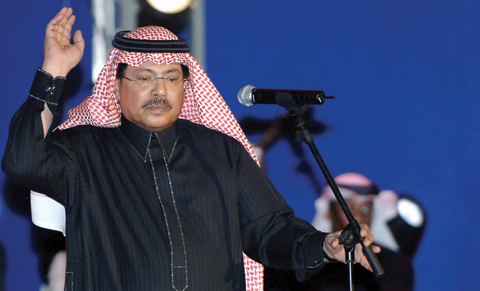 This file photo taken on January 4, 2007 shows Saudi-Yemeni singer Abu Bakr Salem performing during the fourth night of the annual Muscat Festival in the Omani capital.-AFP
This file photo taken on January 4, 2007 shows Saudi-Yemeni singer Abu Bakr Salem performing during the fourth night of the annual Muscat Festival in the Omani capital.-AFPAbu Bakr Salem, one of the most popular singers of the Gulf who synthesized Yemen's rich musical traditions, has died aged 78 in Saudi Arabia after leaving an indelible mark on music in the Arab world. Salem, who held Yemeni and Saudi nationalities, died of a long illness Sunday in a Riyadh hospital, his son Aseel Abu Bakr said in a Twitter post. "My father and mentor has passed away," he said. Salem was mourned in war-torn Yemen, both by the Huthi rebels and the internationally-recognized government the insurgents are battling, and in Saudi Arabia.
The Huthi rebels who control the Yemeni capital Sanaa mourned "one of the rare Arab artists to combine song, composition, musical arrangement and poetry", the insurgents' media reported. The government of President Abedrabbo Mansour Hadi, based in the southern port city of Aden, also paid tribute to Saleh, calling him in a statement "a giant of Yemeni, Gulf and Arab music". Dubbed by music critics as the "father of Khaleeji (Gulf) music" and considered one of the most popular singers in the region, Salem had a rich repertoire ranging from romantic ballads, folk music to patriotic songs.
He began his career in 1956 in southern Yemen-an independent state prior to the country's reunification in 1990 -- where he created songs fusing traditional sounds from Aden to those of the southeastern province of Hadramawt and later Sanaa. Salem's patriotic odes to Yemen celebrated landmarks in the country's history-from the abolition of the monarchy in the north in 1962 to the independence of the south in 1967, and finally the unification of Yemen in
1990.
His repertoire also includes songs paying tribute to Saudi Arabia, where he is very popular and which granted him citizenship. Generations of Arab singers from the Gulf to Lebanon and Syria and even Morocco have sangs his songs.
Salem gave numerous concerts across Gulf countries in the 1990s and the early 200s at the height of his career, drawing adoring crowds each time.- AFP










